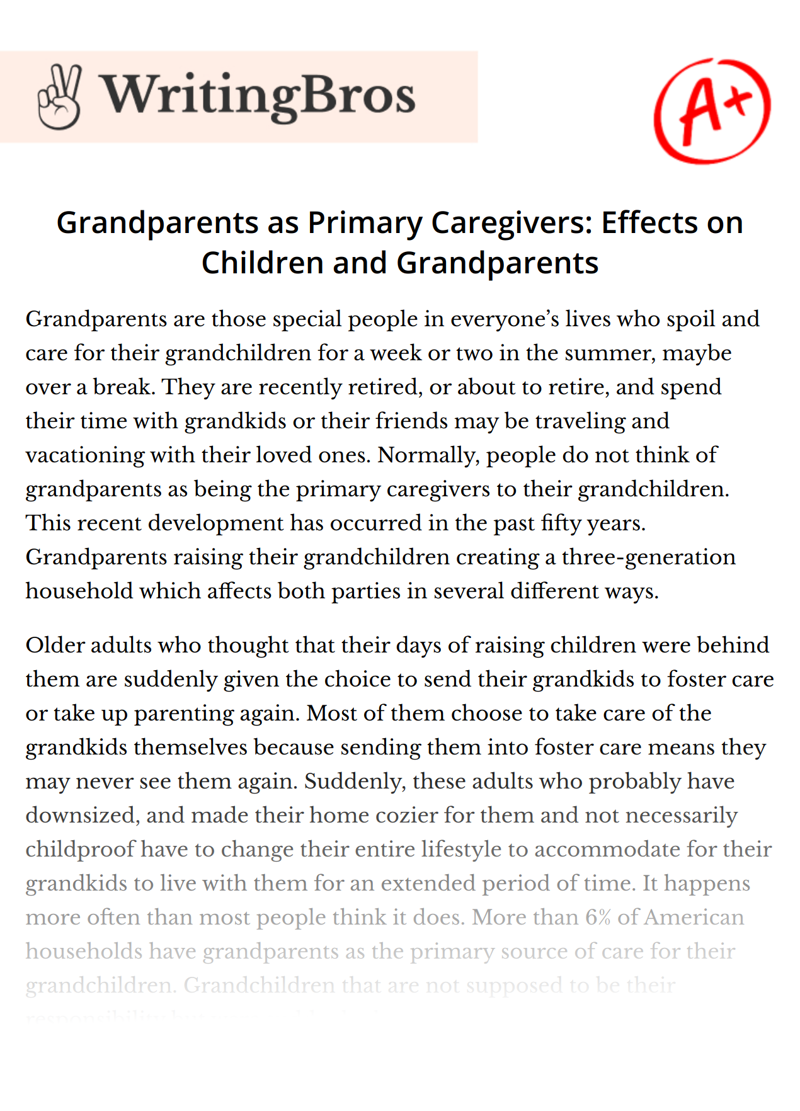Grandparents as Primary Caregivers: Effects on Children and Grandparents

Grandparents are those special people in everyone’s lives who spoil and care for their grandchildren for a week or two in the summer, maybe over a break. They are recently retired, or about to retire, and spend their time with grandkids or their friends may be traveling and vacationing with their loved ones. Normally, people do not think of grandparents as being the primary caregivers to their grandchildren. This recent development has occurred in the past fifty years. Grandparents raising their grandchildren creating a three-generation household which affects both parties in several different ways.
Older adults who thought that their days of raising children were behind them are suddenly given the choice to send their grandkids to foster care or take up parenting again. Most of them choose to take care of the grandkids themselves because sending them into foster care means they may never see them again. Suddenly, these adults who probably have downsized, and made their home cozier for them and not necessarily childproof have to change their entire lifestyle to accommodate for their grandkids to live with them for an extended period of time. It happens more often than most people think it does. More than 6% of American households have grandparents as the primary source of care for their grandchildren. Grandchildren that are not supposed to be their responsibility but were suddenly thrust upon them. In the 1970’s it was only 3% of American households had grandparents as the primary caregivers this has doubled in the past almost 50 years (Young, 2016).
Grandparents are affected differently than the grandchildren are affected by the sudden change in both of their lives. The grandparents previously may not have had as much to stress about but children can be stressed. They will cause the older adults who have become used to a low-stress environment to recondition themselves to the very stressful situation that children can bring with them. Children no matter what age is a major time commitment. If they are a baby to sixteen-year old’s there is still a large number of time grandparents have to take out of their lives to take care of them. Since they are older, they may not care but as time goes by, they may be most susceptible to physical disabilities or not having as much energy as younger parents would have.
The children would be just as greatly affected by the sudden change in their lives because of the mental hardships that occur when forcibly moved to another location permanently. The child, or children, maybe recovering from what happened to their parent, or parents. They could be angry, sad at their parents, or depressed if their parents recently passed away. The child could be dealing with addiction because their parent has addicted themselves and passed it down to them as well as other things.
In a study conducted in 1998, in an inner-city area, the students who were being raised by their grandparents were doing worse than other students academically. 30% of the children raised by their grandparents had a learning disability or were academically handicapped that negatively impacted them academically. 63% of the children were held back, or repeated, a grade which negatively impacts their moral towards school (Edwards, 1998, p. 175).
This is a pressing issue that is just recently catching the attention of psychologists and researchers in the United States because of how much it has grown in the past couple of decades. From 2001 to the present there was a 30% increase in three-generation households where the grandparents were the primary caregiver for the grandchildren (Bronfenbrenner, 2017). Society tends not to care until it directly affects them but when there are cuts to what is provided for the elderly this directly affects the children. It also works the other way because if there are cuts to what is provided for the children it directly affects the grandparents (Bronfenbrenner, 2017).
Researchers do not fully understand the effect that this will have on the children and adults’ long term because there is not enough research and evidence to have a complete answer to the problem.
Cite this Essay
To export a reference to this article please select a referencing style below

